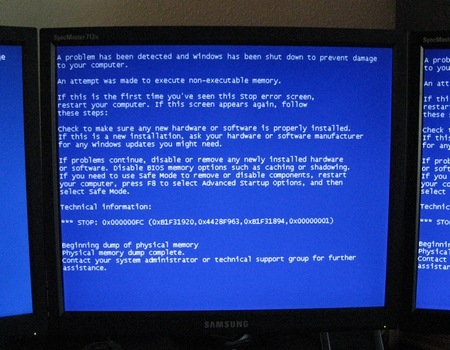Updated: A PACE Anti-Piracy official has officially requested that we remove an image of the iLok product. While they asked not to be publicly quoted, they have challenged the technical accuracy of Adam’s blog post, saying they don’t believe their product caused the Blue Screen of Death. If PACE chooses to release an official reply, we will share it.
The debate over copy protection in music software and anti-piracy tactics continues to heat up. Now Adam Schabtach of Audio Damage, the popular plug-in developer, has fired off a call for a boycott of products that use PACE and the iLok hardware dongle. And that means that Waves is again a target, in this case because Adam himself had technical difficulties resulting from the copy protection scheme. But here’s his argument: the problem isn’t copy protection per se, it’s that developers have to cede control to a third party when the technology breaks.
This points up the biggest problem with PACE: if something goes really wrong, the maker of the PACE-wrapped product can’t help you. They didn’t invent PACE, they can’t fix bugs in PACE, they often don’t even know enough about PACE to troubleshoot it (which is not so much a reflection of their ignorance but of the sheer arcane complexity of PACE and the amount of information about it which its makers do not release even to their customers). Their only recourse is to tell you to wipe your hard drive bare and start again. This is one of many reasons that Audio Damage doesn’t use PACE: we want to help our customers make music, and we don’t want to be in a position in which we have to say “sorry, can’t help you” if something goes wrong with one of our products. Of course, unlike Audio Damage, Waves doesn’t offer a money-back guarantee for their products, so in the end I was stuck with software I’d paid for but couldn’t use.
Adam just doesn’t like copy protection, right? Well, no, in fact. The issue is that while PACE fails to stop piracy (something admitted by Waves themselves as they sue studios around the world for millions of dollars), PACE did succeed in stopping Adam from using his software:
I went to the Waves website, logged in to my account, downloaded the latest installer, and retrieved my iLok from the shelf upon which it was gathering dust. I backed up my hard drive (”once bitten, twice shy” and I’ve been bitten way more than once by PACE), launched the installer, and held my breath. The installer almost immediately informed me that it had to restart my PC, so I let it. It launched itself automatically after the PC rebooted, started the installation process, and then my good faith and efforts were rewarded with [a Windows Blue Screen of Death].
… A PC running Windows puts this up when something goes really, really wrong and the OS makes the unilateral decision to bring all proceedings to a halt in order to prevent further mishap. Seeing this screen is the computer equivalent of seeing your car deploy its airbags.
The final analysis:
PACE doesn’t stop piracy; any copy-protection system can, and will be, defeated. What PACE does do is prevent legitimate users of software products from using products which they’ve paid for.
Why I Boycott Products That Use PACE/iLok (and Why You Should, Too)
PACE/iLok is the leading provider of this kind of copy protection, so I expect we may hear a response. If I can get a statement from them, I’ll post that soon. But I will say, Adam is not alone in his frustration. Developers will continue to make the choices they feel are right for their business, which is their prerogative — but it’s likewise the choice of their customers to vote with their wallets. I do know users who are perfectly comfortable with iLok. Let us know how you feel, and whether copy protection has influenced your purchasing decisions.
Updated: Note that we’re talking about two different kinds of copy protection offered by PACE. One is the PACE software protection, which does not use a hardware dongle (or “hardware key” as PACE prefers to call it). The other is the iLok.
Already, readers are split: we’ve got Max/MSP users (myself included) who haven’t had problems with PACE software protection, and even some iLok hardware users who haven’t been bothered. But there are some strong arguments against the hardware dongles, to the point of cutting into sales, something developers may want to watch closely. Keep the feedback coming.
